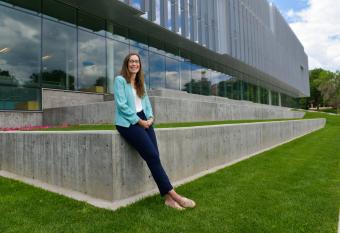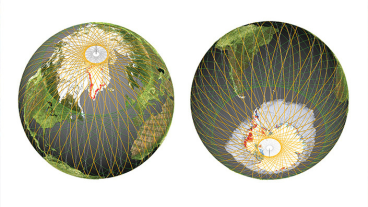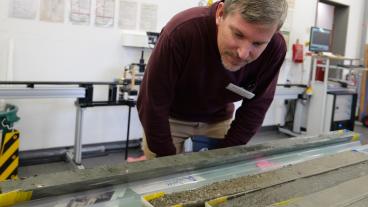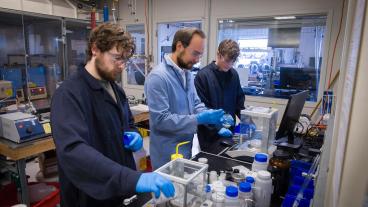Jessica M. Smith named 2025 Andrew Carnegie Fellow

Jessica M. Smith, Dean’s Fellow of Earth and Society Programs and professor of anthropology in the Engineering, Design and Society Department at Colorado School of Mines, has been named a 2025 Andrew Carnegie Fellow.
An anthropologist who studies energy, engineering and public accountability, Smith is one of 26 scholars across the United States – and the first Mines professor ever – selected for the prestigious honor. The jury included leaders from the American Association for the Advancement of Science, National Academy of Sciences, American Council of Learned Societies and the country’s top universities.
Known as the “brainy award,” the Carnegie is the most generous fellowship for book projects in the social sciences and humanities. Smith will use the $200,000 fellowship to investigate how the energy transition is reshaping the politics of working Americans, as well as how academics, journalists and policymakers understand and represent those politics. She focuses specifically on how people in Gillette, Wyoming, and Pueblo, Colorado, are navigating the coal downturn. Mines in Gillette – Smith’s hometown – have historically provided coal to Xcel’s Comanche coal-fired power plant in Pueblo, which is scheduled to go offline by 2031.
“I grew up in a coal mining community and have experienced first-hand how frustrating it is when popular and academic diagnoses of the ‘problem’ of blue-collar voters rest on caricatures," Smith said. “Through careful ethnographic and historical research, I hope to present a more empathetic and nuanced portrayal of working Americans that will help us collectively rebuild civic discourse.”
Founded in 2015 by the Carnegie Corporation of New York, the Andrew Carnegie Fellows Program supports research in the humanities and social sciences, distributing more than $59 million to date. A second phase of the program, launched in 2023, focused the work on helping Americans understand how and why our society has become so polarized and what we can do to strengthen the forces of cohesion in our society. Recipients are expected to produce either a book or a significant study in their field.
Smith speaks and publishes widely on the energy transition, blue-collar work and corporate accountability. She is the author of two books, Extracting Accountability: Engineers and Corporate Social Responsibility (MIT Press, 2021), which was funded by the National Science Foundation, and Mining Coal and Undermining Gender: Rhythms of Work and Family in the American West (Rutgers University Press, 2014), which was funded by NSF and the National Endowment for the Humanities.
A member of the Mines faculty since 2012, Smith is a frequent collaborator with engineering and applied science researchers in the energy fields, leading efforts to integrate societal considerations into Mines’ extensive energy and natural resources research portfolio. Her recent research on carbon capture and storage has been funded by the Alfred P. Sloan Foundation and the U.S. Department of Energy.
Smith currently serves as Editor-In-Chief of the journal Engineering Studies and as a member of the National Academies’ Committee on Geological and Geotechnical Engineering. She was named a Kavli Fellow by the National Academy of Sciences in 2022 and held a British Academy International Visiting Fellowship at the University of St. Andrews in 2018. She holds a PhD in anthropology from the University of Michigan and a BA from Macalester College.
“I can’t think of a more deserving researcher than Jessica Smith to win Mines’ first-ever Andrew Carnegie Fellowship,” said Walter Copan, Vice President for Research and Technology Transfer at Mines. “Her research provides transformational insights for stakeholder engagement in our changing energy and mineral resource development landscape, bringing the voices of people and communities together with private and public sectors to find solutions that really work.”
“Jessica has continually raised the bar in leading Science and Technology Studies research and activities across campus and globally. Her contributions from work with oil and gas communities to coal mining and carbon capture operations highlight the importance of blending ethnographic studies with advances in engineering and science technology,” said Terri Hogue, dean of Earth and Society Programs at Mines. “Jessica is incredibly deserving of this prestigious award – and we are fortunate to have her as part of the Mines community.”
With the support from Carnegie, Smith plans to write a book entitled Rage and Recovery: Navigating Polarization in the (Other) Coal Country, focused on the differing paths of Gillette and Pueblo as the U.S. coal market has eroded.
People in Gillette, the country’s largest coal producer of coal, are actively seeking to save coal via carbon capture, utilization and storage and national policymaking. In Pueblo, environmental and energy justice activists are working to create new energy systems that address past harms and disproportionate burdens.
“I'm honored to have been selected as an Andrew Carnegie Fellow and to receive support for this research, which is urgent given the speed of the energy transition," Smith said. “Starting with working people’s yearning to belong can provide the grounds for both rebuilding trust in civic institutions and collectively imagining more ethical and inclusive energy futures, and I hope the lessons of Gillette and Pueblo can spur national-level reconsiderations of how we might collectively imagine more ethical energy futures that shore up rather than erode civic life."




